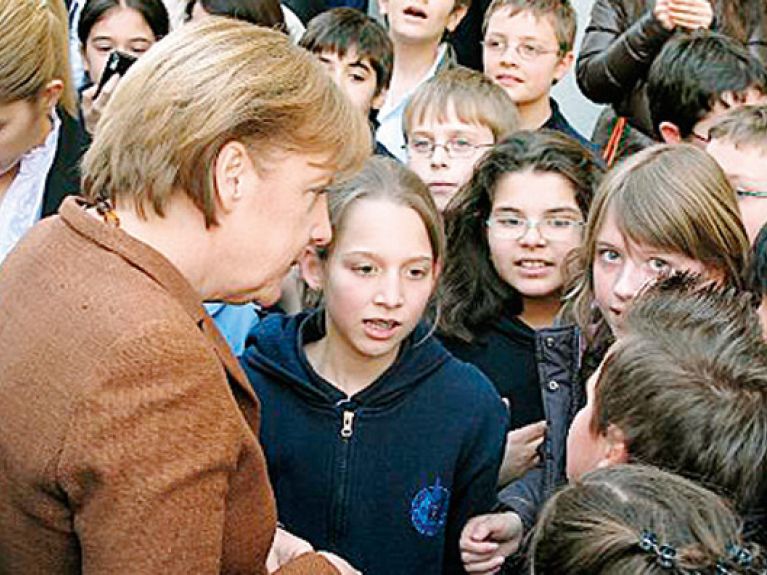Best practice – global learning
Learning for life – what that means in the 21st century is demonstrated by the 141 German schools abroad. We profile eight schools with different emphases – from vocational training to inclusion.

ISTANBUL
High above the Golden Horn lies the Istanbul Lisesi, an outstanding German school abroad.
Istanbul Lisesi is a school that builds bridges. Located at the meeting place between Europe and Asia, the Istanbul high school with its large German section is both a Turkish state school and a German school abroad. Its special feature: the country’s most talented students attend the school whatever their parents’ income. The school places special emphasis on mathematics and the natural sciences. Istanbul Lisesi is the only German school abroad that is a member of the prestigious Verein mathematisch-naturwissenschaftlicher Excellence-Center an Schulen, a network of outstanding schools specialising in mathematics and sciences. Its students are also gifted linguists. Although many arrive with no knowledge of German, most end their school career with Abitur, the German qualification that entitles them to study at a German university. The young people are prepared for this very early on. Since 2010 the high school on the Bosporus has been cooperating with the Technische Universität Kaiserslautern on a distance study programme. For this innovative project to enable gifted students to build ties with higher education before leaving school, Istanbul Lisesi received the first prize in a competition for German schools abroad organised by German Chambers of Industry and Commerce. ▪
MADRID
The FEDA training centre in the Spanish metropolis Madrid has a tradition of pursuing new approaches.
If you think German schools abroad only offer a traditional general education, then Formación Empresarial Dual Alemana (FEDA) will make you change your mind. The centre in Madrid (and Barcelona) has been offering bilingual intercultural vocational training since 1982. Programmes are available for different commercial occupations, including a Spanish-language training programme for salespeople, which was launched in 2013. The two-year vocational training is divided into blocks of theoretical learning and practical work. The companies that take on trainees and belong to the school association include prestigious names – not only established German firms like agricultural machinery manufacturer Claas, but also Spanish fashion businesses like Desigual. This strategy enabled the FEDA centre to become the first independent vocational school abroad to be officially recognised by the Standing Conference of Ministers of Education (KMK). The Madrilenians set a trend. The dual vocational education system is now on everyone’s lips in light of the high youth unemployment in many European countries. In addition to providing a solid foundation for entering the world of work, it can also open the door to higher education. Students can obtain an entrance qualification for a university of applied sciences, and higher education institutions can also recognise knowledge acquired during training to reduce the duration of study. In addition to the two vocational schools in Spain, Germany supports eight dual vocational education centres (BBZ) and three specialised secondary schools around the world. Dual vocational training is concentrated in the Spanish-speaking countries with a total of 700 students. However, the number is set to rise. A proposal for a dual vocational training programme at the German School in Thessaloniki, Greece, has now entered the first phase of implementation. And the government of Ecuador has appointed the former BBZ director as the consultant for introducing dual vocational training in the country. ▪
MANAGUA
The German School Managua, one of the most prestigious schools in Nicaragua, promotes inclusion with a lateral entry programme.
Glenda Urbina is successfully studying psychology at Martin Luther University Halle-Wittenberg after completing her International Baccalaureate at Colegio Alemán Nicaragüense. Teachers recognised her talent. The lateral entry programme at the school in Managua enabled Glenda Urbina to receive an education that matches her abilities. It supports gifted children from poor families. These boys and girls, who would otherwise never have a chance of completing a 12-year school education, are recommended by their teachers. Some can receive a “motivation scholarship” to study in Germany. This is what happened to Gloriana, who studied medicine in Freiburg and now works as a paediatrician at a hospital in the Nicaraguan capital. A pilot project with an online donation platform aims to help expand the lateral entry programme. ▪
SINGAPORE
Schools in the Southeast Asian business metropolis of Singapore have to technologically up-to-date. The German European School Singapore is considered a showcase in that area.
The city state with 5.5 million inhabitants at the southern tip of the Malaysian peninsula is the educational centre of Southeast Asia. The rise of Singapore was accompanied by the development of the German European School Singapore (GESS) into a showcase institution. It was founded in 1971 as a school for the children of people who worked for German firms in the up-and-coming region. In order to maintain its position in Singapore’s competitive educational landscape, the school on the edge of a jungle nature reserve opened a European section with English-language tuition. The school’s reputation in the new field of information and communication technology (ICT) has also contributed to its success. One example is the Global School Project. GESS uses an interactive videoconferencing system to enable simultaneous teaching for upper school students in Singapore and at the German school in Chiang Mai in northern Thailand. This digital linkup between two classrooms is an innovative programme of the Central Agency for Schools Abroad (ZfA). ▪
SÃO PAULO
The Colégio Visconde de Porto Seguro in São Paulo is the largest German school abroad.
Although Germany is 10,000 kilometres away, students proudly hold a Schultüte, a paper cone full of sweets, in their arms on their first day at the Colégio Visconde de Porto Seguro in southern Brazil. Like most German schools in Brazil, it was opened at the beginning of the 20th century by German immigrants. Today, with a total of five sites, the Colégio Visconde de Porto Seguro is Brazil’s largest private school. Some of the students have their school fees waived for social reasons. Boys and girls in the bilingual section get to know two cultures from kindergarten onwards. German traditions are cultivated: children in all year groups compete for the German Sports Badge – and the Colégio Visconde de Porto Seguro is the world’s most successful school when it comes to this sporting distinction. ▪
DUBLIN
St. Kilian’s German School in the international melting pot of Dublin places special emphasis on inclusion and sustainability.
Children from more than 50 nations learn together at St. Kilian’s German School in the Irish capital. The school was founded in the 1950s. After the Second World War the Irish Red Cross brought orphans from Germany to Ireland as part of Operation Shamrock. Because a group of committed people did not want them to completely forget their mother tongue, they established a strong education institution. “St. Kilian’s imports education ‘made in Germany’. Personally, I primarily associate that with high quality,” emphasises the principal, Alice Lynch. In 2005, St. Kilian’s and the French school Lyceé Français d’Irlande established a Eurocampus in south Dublin. “We have created a learning environment in which our students encounter other nations, cultures and languages. They learn respect for difference, and this does not only apply to a person’s origin. As an inclusive school we also accept children with disabilities,” reports Alice Lynch. It is also rather appropriate that the German school on the Emerald Isle has shown great commitment to the Green School environmental project – and received an award for its efforts. ▪
CAIRO
The Deutsche Schule der Borromäerinnen (DSB) in Cairo concentrates on providing a solid education for girls in a transformation society.
Among the many different German schools abroad, those run by the Sisters of Mercy of St. Borromeo in Alexandria and Cairo stand out. The Catholic nuns have run the schools in the Northafrican country for over 100 years. The school in Alexandria was founded in 1884 for German-speaking children whose fathers were employed at the port. Because of the great demand, the sisters opened another DSB in the Egyptian capital in 1904. Since 1946 only girls have been admitted. The students are mainly Egyptian, some of them are Moslems and some Christians. The school considers it important to encourage the girls’ development into self-confident, creative and responsible personalities in order to support their influence within the family and Egyptian society – a society in transformation that needs bright minds. ▪
CAPE TOWN
Overcoming divisions is part of the curriculum at the German International School Cape Town.
The children of the German International School Cape Town sing their school song in four languages. “Little Berlin on the hill, Cape Town in the hearts of all. We are the international to special mission called.” The verses in German, English, Afrikaans and Xhosa have not only been sung here since the end of the racist Apartheid regime. When discrimination against non-white people was normal in South Africa and Nelson Mandela was still in prison, the German International School was open to people of all colours. Children from townships have long been able to attend the “new secondary level”. The Federal Government subsidises the fees of children who would otherwise not be able to go to the school. Like Demelza Mulligan, for example. The 30-year-old former student studied international management at Münster University of Applied Sciences. Mulligan’s strengths include intercultural competence. Today she works for a German company in Johannesburg. ▪

